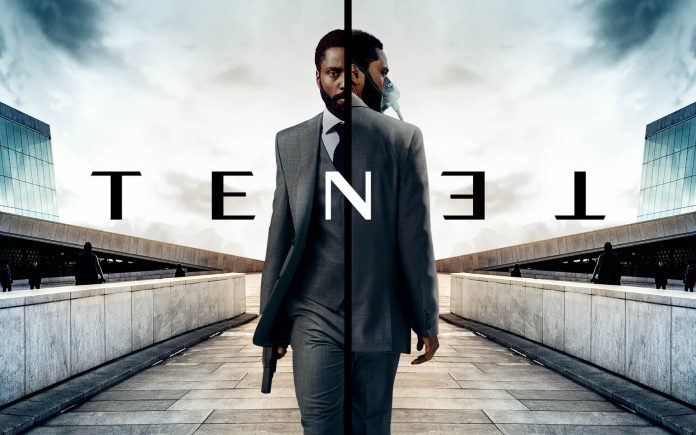Warner Bros.’ Tenet is yet another mind-bending sci-fi adventure from Christopher Nolan. The film starts off with a CIA agent, the Protagonist (John David Washington) and his three teammates dressing up as SWAT team members and entering the Kiev Opera House to rescue a target and acquire an object of great importance. At one point, when he is about to be killed by a henchman, a mysterious figure in black intervenes and saves him by shooting the henchman with a bullet that seemingly moves in reverse. The mission goes kaput and the Protagonist is captured and tortured to reveal the identity of his team and the organisation. Rather than give up his teammates, he manages to get his hands on a cyanide pill and ends his life. He wakes up on a ship to realise that the whole mission and the torture was a test, and that he was being vetted by a covert organisation trying to save the world. Armed with a gesture and a word, Tenet, the Protagonist sets out to uncover the truth and save the world.
His first stop is at a research facility where he meets Laura (Clémence Poésy) who explains to him the concept of Inverted objects, which means objects of which entropy has been reversed and they are moving back in time. She says that they have discovered many such objects which are inverted and that the bullet that he encountered at the Opera House was just one of them. He actually fires inverted bullets which jump out from the target and move backward to enter into the magazine of the gun, making it seem that he’s actually catching the bullets rather than firing them. As he traces the origin of these particular bullets, he zeroes in on an arms dealer in Bombay, Sanjay Singh (Denzil Smith). To infiltrate Sanjay Singh’s house, he requests assistance and he is assigned a British operative, Neil (Robert Pattinson). Together, they sneak into Sanjay Singh’s house, only to discover that Sanjay is just a decoy and that the brain behind the operation is his wife, Priya (Dimple Kapadia). She tells him that the bullets they manufactured were bought by a Russian oligarch, Andrei Sator (Kenneth Branagh) and that he might hold the key to how they were inverted.
Priya asks the Protagonist to get in touch with her contact in London, Sir Michael Crosby (Michael Caine). In turn, Crosby briefs him about Sator and tells him that the best way to get access to him would be through his wife, Kat (Elizabeth Debicki), who is an art appraiser. The Protagonist approaches Kat at a London auction house with a Goya painting which she instantly recognises as a fake because she herself had appraised a fake Goya and verified it as real which her husband, Andrei Sator, had bought. Her abusive husband has that painting safely stored, to blackmail her and keep her in check. The Protagonist offers to steal the painting for her, in lieu of a meeting with Sator.
He embarks on a mission with Neil and a pilot, Mahir (Himesh Patel), to steal the fake Goya painting from a free port in Oslo, where he runs into two mysterious SWAT team members who emerge from a revolving door and one of whom seems to be inverted and moving backwards in time.
As the mystery unravels, the Protagonist realises that Sator is collecting pieces of an algorithm to create a weapon that was created in the future, with its pieces hidden in the past. A weapon that can invert the whole world and in doing so, destroy it completely. Why does Sator want to destroy the world? Who are the mysterious inverted individuals that keep appearing? How will the Protagonist fight the future and change what has already happened?
Christopher Nolan’s screenplay is like a riddle, wrapped in a mystery, inside an enigma. Even after repeat viewings, viewers will be left scratching their heads, trying to make sense of the plot. The complexity of Tenet makes his previous films like Interstellar and Inception seem simple and accessible.The concept of Inversion is very different from time travel and the idea of objects moving back in time as the rest of the world moves forward, will be difficult to understand, especially within the context of the film. The film clocks in at about 2.5 hours and even around the 1.5-hour mark, the audience will find it hard to make sense of the proceedings. The film does offer some clarity towards the end but it might not be enough to make the viewer feel completely satisfied.
John David Washington and Robert Pattinson are excellent as the leading men. They have style, machismo and a sense of humour thrown in for good measure. Elizabeth Debicki, as Kat, the troubled wife, and Kenneth Branagh as ruthless villain Andrei Sator, also give solid performances. Supporting turns from Dimple Kapadia, Himesh Patel and Aaron Taylor-Johnson are also commendable.
All technical aspects are excellent, especially the cinematography by Hoyte Van Hoytema. Beautiful locations around the world and complex action pieces have been shot wonderfully. The score by Ludwig Göransson is also excellent and plays well, especially with the breathtaking action scenes. A special mention must be made of the wonderful action and fight scenes that look amazing and leave the viewers wondering how they were filmed. Fight scenes, where one person seems to be moving forward in time as the other moves in reverse, look breathtakingly unreal. An often-used phrase when it comes to movies is ‘unlike anything you’ve seen’ but the action scenes in Tenet are absolutely unlike anything you have ever seen. Dubbing is superb.
On the whole, Tenet is an audacious attempt by Christopher Nolan to explore even more complex ideas and further ramp up the scale of his filmmaking. While the latter goal is wonderfully achieved, the former might prove to be a bit too much for the audience (of dubbed films) in India. Most of Nolan’s plots are complex, but as soon as the film ends, many viewers would want to watch it again to make complete sense of it. However, Tenet leaves the audience so confused that unless one is a hardcore fan, it is unlikely that one would go in for another viewing. Nevertheless, there are enough fans of Nolan in India for the film (in English, released simultaneously) to fare excellently initially, at least. Additionally, the public has finally got a film for which they would feel inclined to venture into the cinemas after months of boredom, being confined to their homes during the lockdown. The new concept of Inversion will be a talking point for the audience in India too. Business of the original English version in IMAX screens and otherwise too, in the big cities will be very good. In the cities, the English version will be liked not just by the classes but also by the masses. Business of the dubbed version will be so-so.
Released on 4-12-’20 at Maratha Mandir (daily 3 shows) and other cinemas of Bombay by Warner Bros. Publicity: excellent. Opening (of dubbed Hindi version): fair in big cities despite the coronavirus scare. …..Also released all over. Opening was alright in all major cities. …..The original English version’s opening was extraordinary in the IMAX screens of the big cities, fairly nice in other screens of the big cities, and so-so in smaller towns.





























